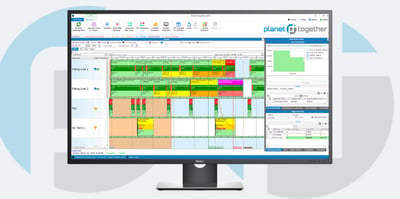Failure Analysis in Manufacturing
In the intricate dance of industrial manufacturing, failure is not merely an occasional visitor but an inevitable companion. As an Operations Director, you understand that navigating through the labyrinth of failures requires a combination of foresight, adaptability, and a robust framework for analysis.
In this blog, we look deep into the realm of failure analysis, exploring its significance, challenges, and strategies for operational excellence. Moreover, we will discuss how integration between advanced planning and scheduling (APS) software like PlanetTogether and leading ERP, SCM, and MES systems can revolutionize failure analysis processes.

Failure in Manufacturing
Failure in manufacturing can manifest in various forms, ranging from equipment breakdowns and supply chain disruptions to quality defects and missed deadlines. Each failure carries its own set of consequences, be it financial losses, damaged reputation, or compromised customer satisfaction. However, failure should not be viewed solely as a setback but as an opportunity for improvement. By dissecting the root causes of failures, organizations can unearth valuable insights that drive continuous enhancement across all facets of operations.
Challenges in Failure Analysis
Despite its importance, failure analysis poses significant challenges for manufacturers. One of the primary hurdles is the complexity of modern manufacturing ecosystems, characterized by interconnected processes, diverse technologies, and global supply chains. Pinpointing the exact cause of a failure amidst this complexity requires sophisticated analytical tools and methodologies. Moreover, traditional approaches to failure analysis often lack real-time visibility and predictive capabilities, leading to reactive rather than proactive responses to failures.


The Role of Advanced Planning and Scheduling Software
This is where advanced planning and scheduling (APS) software like PlanetTogether comes into play. By leveraging advanced algorithms and data analytics, APS solutions enable manufacturers to optimize production schedules, allocate resources efficiently, and mitigate risks associated with failures. Integration between APS and ERP, SCM, and MES systems further enhances the efficacy of failure analysis processes by facilitating seamless data exchange and workflow automation.

Integration with Leading ERP, SCM, and MES Systems
When it comes to integration, manufacturers have a plethora of options, including SAP, Oracle, Microsoft, Kinaxis, and Aveva, among others. Each of these systems brings its own unique strengths to the table, whether it's SAP's robust financial management capabilities, Oracle's comprehensive suite of supply chain solutions, or Microsoft's seamless integration with productivity tools like Microsoft Teams.
By integrating PlanetTogether with these leading platforms, manufacturers can create a unified ecosystem where data flows seamlessly across all levels of the organization, enabling real-time decision-making and collaboration.
Benefits of Integration
The benefits of integrating PlanetTogether with ERP, SCM, and MES systems extend far beyond failure analysis. From optimizing inventory management and streamlining procurement processes to synchronizing production schedules with customer demand, integration empowers manufacturers to achieve operational excellence across the board.
Moreover, by breaking down silos between different departments and systems, integration fosters a culture of transparency, accountability, and continuous improvement.
Best Practices for Failure Analysis
While advanced technologies play a crucial role in failure analysis, success ultimately hinges on the adoption of best practices that align with the unique needs and challenges of each organization. Here are some key best practices to consider:
Establish a Culture of Accountability: Encourage cross-functional collaboration and empower employees at all levels to take ownership of failure analysis processes.
Invest in Training and Development: Provide employees with the necessary skills and resources to effectively leverage advanced analytical tools and methodologies.
Leverage Predictive Analytics: Embrace predictive analytics capabilities to anticipate and prevent failures before they occur, rather than merely reacting to them after the fact.
Implement Continuous Improvement: Treat failure analysis as an iterative process, continuously refining strategies and methodologies based on lessons learned and feedback from stakeholders.
Foster a Data-Driven Culture: Emphasize the importance of data-driven decision-making and ensure that accurate and timely data is readily available to all relevant stakeholders.
Failure analysis is not merely a reactive exercise but a proactive pursuit of operational excellence. By embracing advanced planning and scheduling software like PlanetTogether and integrating it with leading ERP, SCM, and MES systems, manufacturers can unlock new insights, optimize processes, and drive continuous improvement across all facets of operations.
Moreover, by adopting best practices that emphasize accountability, collaboration, and innovation, organizations can navigate through the complexities of failure with confidence and resilience, emerging stronger and more resilient than ever before.
Are you ready to take your manufacturing operations to the next level? Contact us today to learn more about how PlanetTogether can help you achieve your goals and drive success in your industry.